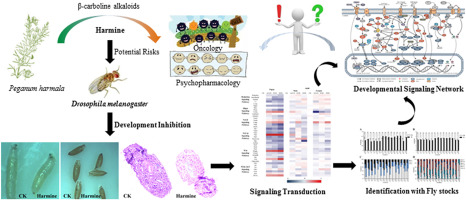当前位置:
X-MOL 学术
›
Ecotox. Environ. Saf.
›
论文详情
Our official English website, www.x-mol.net, welcomes your
feedback! (Note: you will need to create a separate account there.)
Natural harmine negatively regulates the developmental signaling network of Drosophila melanogaster (Drosophilidae: Diptera) in vivo.
Ecotoxicology and Environmental Safety ( IF 6.2 ) Pub Date : 2019-12-31 , DOI: 10.1016/j.ecoenv.2019.110134 Gaofeng Cui 1 , Haiqi Yuan 1 , Zhiyan Jiang 1 , Jing Zhang 1 , Zhipeng Sun 1 , Guohua Zhong 1
Ecotoxicology and Environmental Safety ( IF 6.2 ) Pub Date : 2019-12-31 , DOI: 10.1016/j.ecoenv.2019.110134 Gaofeng Cui 1 , Haiqi Yuan 1 , Zhiyan Jiang 1 , Jing Zhang 1 , Zhipeng Sun 1 , Guohua Zhong 1
Affiliation

|
The widely distributed β-carboline alkaloids exhibit promising psychopharmacological and biochemical effects. Harmine, a natural β-carboline, can inhibit insect growth and development with unclear mechanisms. In this study, harmine (at 0-200 mg/L) showed a dose-dependent inhibitory effect on the pupal weight, length, height, pupation rate and eclosion rate of fruit flies Drosophila melanogaster, which was similar to the inhibition induced by the well-known botanical insect growth regulator azadirachtin. Moreover, the expression levels of major regulators from the developmental signaling network were down-regulated during the pupal stage except Numb, Fringe, Yorkie and Pten. The Notch, Wnt, Hedgehog and TGF-β pathways mainly played vital roles in coping with harmine exposure in pupae stage, while the Hippo, Hedgehog and TGF-β elements were involved in the sex differences. Notch, Hippo, Hedgehog, Dpp and Armadillo were proved to be suppressed in the developmental inhibition with fly mutants, while Numb and Punt were increased by harmine. In conclusion, harmine significantly inhibited the development of Drosophila by negatively affecting their developmental signaling network during different stages. Our results establish a preliminary understanding of the developmental signaling network subjected to botanical component-induced growth inhibition and lay the groundwork for further application.
中文翻译:

天然甜菜碱在体内负面调节果蝇(Drosophila melanogaster)(Drosophilidae:Diptera)的发育信号网络。
广泛分布的β-咔啉生物碱具有良好的心理药理和生化作用。Harmine是一种天然的β-咔啉,可以通过不清楚的机制抑制昆虫的生长和发育。在这项研究中,甜菜碱(0-200 mg / L)对果蝇的果蝇体重,身长,身高,化脓率和出雏率表现出剂量依赖性的抑制作用,与果蝇的果蝇抑制作用相似。著名的植物昆虫生长调节剂印za素。此外,除了Numb,Fringe,Yorkie和Pten外,在the期,来自发育信号网络的主要调节子的表达水平也被下调。在ch阶段,Notch,Wnt,Hedgehog和TGF-β途径主要在应对甜菜碱暴露方面起着至关重要的作用,而河马,刺猬和TGF-β元素参与了性别差异。事实证明,果蝇突变体可抑制Notch,Hippo,Hedgehog,Dpp和Armadillo的发育抑制,而Numb和Punt则被harmine增加。总之,在不同阶段,甜菜碱会对果蝇的发育信号网络产生负面影响,从而显着抑制果蝇的发育。我们的结果建立了对受植物成分诱导的生长抑制作用的发育信号网络的初步了解,并为进一步的应用奠定了基础。甘氨酸通过在不同阶段对果蝇的发育信号网络产生负面影响,可显着抑制果蝇的发育。我们的结果建立了对受植物成分诱导的生长抑制作用的发育信号网络的初步了解,并为进一步的应用奠定了基础。甘氨酸通过在不同阶段对果蝇的发育信号网络产生负面影响,可显着抑制果蝇的发育。我们的结果建立了对受植物成分诱导的生长抑制作用的发育信号网络的初步了解,并为进一步的应用奠定了基础。
更新日期:2019-12-31
中文翻译:

天然甜菜碱在体内负面调节果蝇(Drosophila melanogaster)(Drosophilidae:Diptera)的发育信号网络。
广泛分布的β-咔啉生物碱具有良好的心理药理和生化作用。Harmine是一种天然的β-咔啉,可以通过不清楚的机制抑制昆虫的生长和发育。在这项研究中,甜菜碱(0-200 mg / L)对果蝇的果蝇体重,身长,身高,化脓率和出雏率表现出剂量依赖性的抑制作用,与果蝇的果蝇抑制作用相似。著名的植物昆虫生长调节剂印za素。此外,除了Numb,Fringe,Yorkie和Pten外,在the期,来自发育信号网络的主要调节子的表达水平也被下调。在ch阶段,Notch,Wnt,Hedgehog和TGF-β途径主要在应对甜菜碱暴露方面起着至关重要的作用,而河马,刺猬和TGF-β元素参与了性别差异。事实证明,果蝇突变体可抑制Notch,Hippo,Hedgehog,Dpp和Armadillo的发育抑制,而Numb和Punt则被harmine增加。总之,在不同阶段,甜菜碱会对果蝇的发育信号网络产生负面影响,从而显着抑制果蝇的发育。我们的结果建立了对受植物成分诱导的生长抑制作用的发育信号网络的初步了解,并为进一步的应用奠定了基础。甘氨酸通过在不同阶段对果蝇的发育信号网络产生负面影响,可显着抑制果蝇的发育。我们的结果建立了对受植物成分诱导的生长抑制作用的发育信号网络的初步了解,并为进一步的应用奠定了基础。甘氨酸通过在不同阶段对果蝇的发育信号网络产生负面影响,可显着抑制果蝇的发育。我们的结果建立了对受植物成分诱导的生长抑制作用的发育信号网络的初步了解,并为进一步的应用奠定了基础。











































 京公网安备 11010802027423号
京公网安备 11010802027423号